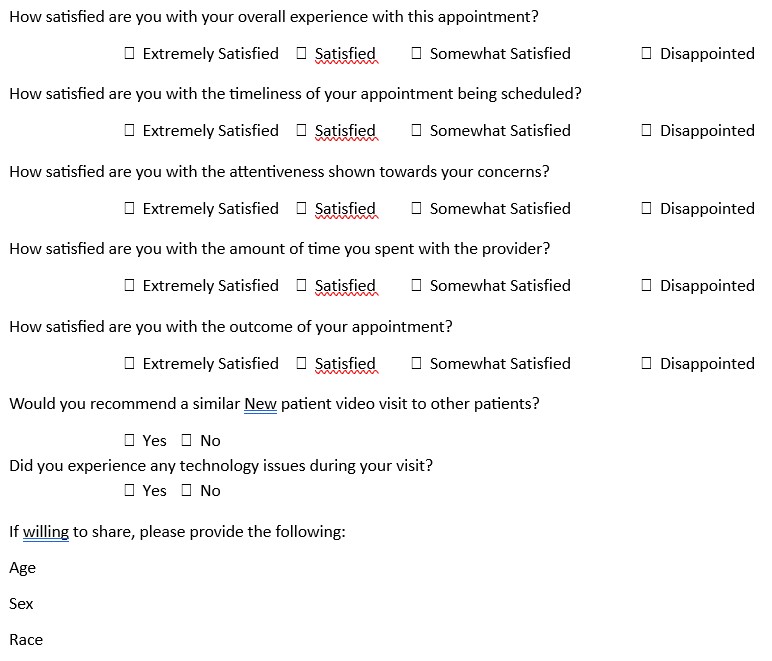Session Information
Session Type: Poster Session A
Session Time: 10:30AM-12:30PM
Background/Purpose: To assist with lowering new rheumatology patient appointment wait times, our division initiated a New Patient Video Triage Program in 2023. In this program, we found the average wait time for a new video triage appointment was less than half of an in-person new patient appointment. However, it was not understood if patients had a positive experience with a new patient video triage visit. Given this, we initiated a patient questionnaire to better understand the patients’ satisfaction of the new patient video triage visit.
Methods: Patients completing a video visit through our New Patient Video Triage Program between March, 2024 and February, 2025 were asked to complete a patient satisfaction questionnaire. The questionnaire (Table 1) included 7 questions and basic demographic information. The answers were received anonymously. Descriptive statistics were initially reported. Continuous variable was reported as mean and standard deviation, while categorical variables were reported as frequency and percentage. ANOVA or t-test were conducted to compare continuous variables between groups. Fisher’s exact test was conducted to examine the association between categorical variables. To control the Type I error rate, Benjamini-Hochberg correction was used to adjust p values. All statistical analyses were conducted under alpha level .05 via SAS 9.4.
Results: 208 surveys were completed. Most of those responding were female (83%) and identified as white/Caucasian (95%). The majority were extremely satisfied with the overall experience of the appointment (81%), the timeliness of the appointment being scheduled (67%), the attentiveness shown towards the patients’ concerns (89%), the amount of time spent with the provider (86%), and the outcome of the appointment (74%). Almost all who responded would recommend a similar new patient video visit to others (96%) and only 14% of patients had technology issues during the visit (Table 2). According to Table 3, except the timeliness of scheduling, all survey items were significantly associated with the patients’ overall recommendation of a similar appointment to others (all p = .0008), indicating that patients who would not recommend the video visit to others were more likely to be disappointed in the other four aspects and patients who would recommend the video visit to others were more likely to be satisfied in the other four areas. Experiencing a technological issue during the video visit was not significantly associated with the satisfaction of the appointment (all p > .05).
Conclusion: Our New Patient Video Triage Program previously showed success in lowering rheumatology new patient wait times. Reassuringly, in this study we have shown that most patients completing the new patient video triage visit and questionnaire were extremely satisfied with the visit and would recommend a similar appointment to others. Having technological issues during the appointment did not impact the patient’s satisfaction and there was not one area that led to overall satisfaction or dissatisfaction. Given these findings, we plan to continue utilizing new patient video triage appointments.
 Table 1: Patient Questionnaire
Table 1: Patient Questionnaire
.jpg) Table 2: Descriptive Statistic Results
Table 2: Descriptive Statistic Results
.jpg) Table 3: Variable Comparison for Patients’ Recommendation to Others
Table 3: Variable Comparison for Patients’ Recommendation to Others
To cite this abstract in AMA style:
Dore A, Yin Y. Patient Satisfaction with a New Patient Video Triage Program [abstract]. Arthritis Rheumatol. 2025; 77 (suppl 9). https://acrabstracts.org/abstract/patient-satisfaction-with-a-new-patient-video-triage-program/. Accessed .« Back to ACR Convergence 2025
ACR Meeting Abstracts - https://acrabstracts.org/abstract/patient-satisfaction-with-a-new-patient-video-triage-program/
